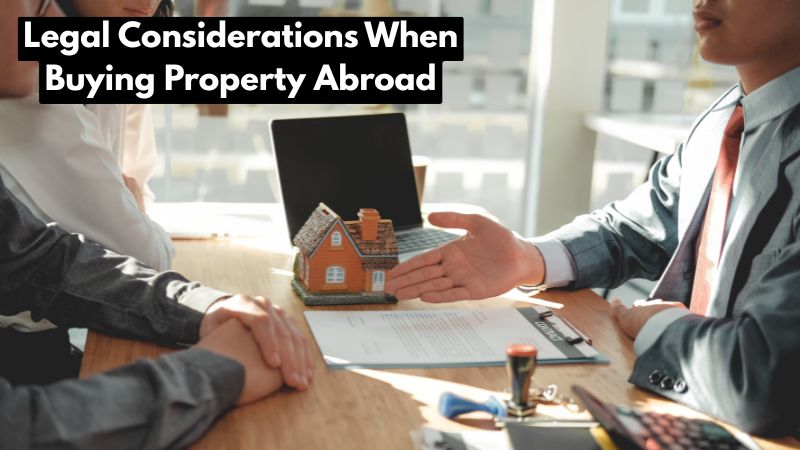Buying property abroad is a dream for many, whether it’s for retirement, vacation, or investment. However, it comes with several legal considerations that you must understand before signing any agreements. Different countries have different laws, and being unprepared can lead to costly mistakes. Here’s a simple guide to the key legal aspects you should be aware of when buying property in a foreign country.
Understand Local Property Ownership Laws
Not every country allows foreigners to buy property freely. Some have strict rules, while others are more welcoming. For example, in Thailand, foreigners can’t own land but can buy a condo. In Mexico, coastal property purchases require a trust setup. Always research the country’s laws or hire a local lawyer before making any commitments.
Some countries may only allow leasehold rather than freehold ownership for foreign buyers. Leasehold means you don’t own the land outright but have the right to use it for a certain number of years. This can impact resale value and inheritance.
Hire a Local Real Estate Lawyer
Hiring a local, licensed real estate lawyer is one of the most important steps you can take. Laws and real estate processes vary greatly, and a local expert can guide you through the paperwork, contracts, and legal requirements.
Avoid using just the seller’s agent or relying on English-speaking staff without legal backgrounds. Make sure the lawyer is independent and has no connection to the seller or agency. Their job is to protect your interests and make sure you comply with local laws.
Check Land Title and Ownership Rights
Always verify that the seller has the legal right to sell the property. This means checking the land title, registry, and other official documents. Your lawyer can help you do this. It’s crucial to ensure there are no disputes, unpaid taxes, or hidden claims on the land.
You should also confirm whether the title is clean and if it’s a full title or only partial rights. Buying property with unclear ownership can lead to future lawsuits or even losing the property.
Understand Residency and Visa Requirements
In some countries, buying property may entitle you to residency, but in others, it does not. For example, in Portugal, the Golden Visa program allows property buyers to apply for residency. But in countries like Japan, owning property doesn’t grant you any immigration benefits.
Before you buy, understand whether your stay in the country will be temporary or permanent. Make sure your visa allows for property management and any rental income, if that’s part of your plan.
Be Aware of Taxes and Fees
Every country has its own property taxes, purchase fees, and ongoing costs. These might include transfer taxes, registration fees, stamp duty, or notary charges. You might also be liable for capital gains tax when selling.
In addition to local taxes, your home country may also tax your foreign income or property. You should speak to a tax advisor in both countries to avoid double taxation and understand your obligations.
Currency Exchange and Payment Rules
When buying property abroad, you’ll often need to transfer large sums of money across borders. Exchange rates can fluctuate and impact your final cost. It’s smart to use a reliable currency exchange service or financial advisor to get the best rate.
Some countries have strict rules about bringing money in or out. There may be limits, reporting requirements, or government approval needed. Always follow the legal process and avoid cash deals, as they may be illegal or unsafe.
Understand Inheritance Laws
Foreign inheritance laws can be very different from your home country. In many countries, property automatically goes to a spouse or children, regardless of your will. This can create problems if you have different inheritance plans.
If you plan to leave the property to someone else, talk to a lawyer about setting up the proper legal documents. You may need to write a separate will for that country or take steps to register your wishes with local authorities.
Consider Local Building and Zoning Laws
If you’re buying land to build on, make sure the area is zoned for residential construction. In some places, building restrictions can be strict. There might be height limits, style requirements, or protected lands where you can’t build at all.
Even in developed areas, you’ll need proper building permits. Failing to get these can result in fines or having your construction torn down. Always consult a local architect or lawyer before starting any building project.
Work with Licensed Real Estate Agents
Make sure your real estate agent is licensed, reputable, and experienced in helping foreigners buy property. Ask for references and look for online reviews. In some countries, real estate is not heavily regulated, so almost anyone can claim to be an agent.
Good agents can help you find legal listings, negotiate fairly, and avoid scams. They should work with your lawyer and help you understand the property market in that area.
Get Everything in Writing
Verbal promises are not enough when it comes to international property deals. Insist that everything is written in a contract and translated into your native language. This includes payment schedules, what’s included with the property, deadlines, and penalties for breach.
Before signing, your lawyer should review every document. Never sign a contract you don’t fully understand. Once signed, it can be legally binding and very hard to reverse.
Beware of Scams and Fraud
Scams are common in the international property market. These can include fake land titles, fake agents, or non-existent properties. Always do your due diligence. Don’t send money without verifying the identity of the seller and confirming property ownership.
Avoid pressure tactics or deals that seem too good to be true. Use trusted escrow services for transferring money. Trust your instincts—if something feels off, step back and investigate.
Register the Property Properly
Once you’ve bought the property, make sure it’s legally registered in your name. In some countries, registration is not automatic and needs to be done by your lawyer or a notary. Without proper registration, your ownership may not be recognized.
Keep all your documents in a safe place, and make digital copies too. You’ll need these for future resale, inheritance, or legal proof.
Seek Advice from Other Buyers
Talking to others who have bought property in the same area can be extremely helpful. Online forums, expat groups, or real estate communities can offer tips and share their experiences. Learning from their mistakes and successes can help you avoid problems.
It’s also a great way to find recommended professionals like lawyers, notaries, and agents. You’ll be more confident going through the process with knowledge and support from others who’ve done it.
Conclusion
Buying property abroad can be an exciting adventure, but it’s important to protect yourself with the right legal knowledge. Always research the local laws, work with a trusted lawyer, and be thorough with your documents. Legal issues can be avoided if you plan ahead, ask questions, and take each step carefully.
Whether it’s a beach house in Spain or a quiet cottage in the countryside of France, being legally prepared ensures your overseas property dreams don’t turn into a legal nightmare. Happy house hunting!



